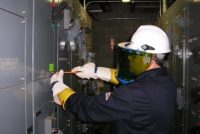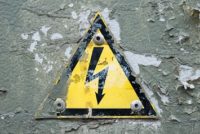Electrical hazards can cause burns, shocks and electrocution (death). OSHA’s design safety electrical standards apply to systems that provide power and light to employee workplaces. These regulations cover electrical installations and equipment installed or used within or on buildings, structures, and other premises. OSHA’s safe work practice rules for electricity provide standards for both qualified employees (those with a specific level of training) and unqualified employees (those with little or no training) who work on, near, or with various electrical components.
The Occupational Safety and Health Administration (OSHA) has increased compliance activities related to electrical safety regulations and standards over the past few years. This began with the heightened interest in arc flash hazards related to the 2000 National Fire Protection Association (NFPA) 70E standard and became more active after the 2004 edition was published.
On our latest episode of the EHS on Tap podcast, an expert answered some big questions about the proper uses of flame resistant (FR) garments within a personal protective equipment (PPE) program. Read the transcript of our conversation with Derek Sang, Technical Training Manager for Bulwark FR.
May was Electrical Safety Month, and to mark the occasion the EHS on Tap podcast sat down with Ralph Parrett, AVO Training Institute’s Senior Instructional Designer and Senior Training Instructor, to discuss common electrical hazards and how to mitigate the risk. If you missed the episode or simply prefer to read rather than listen, read […]
May is Electrical Safety Month, and the danger of electrical hazards remains a constant concern in workplaces nationwide. In fact, electrocution remains one of the four leading causes of workplace deaths in the construction industry, commonly called the “Fatal Four” by OSHA, with approximately 9% of deaths in the workplace being caused by electrocution. In […]
34-year-old James Byrnes of North Beach, Maryland, was working from a ladder, hanging Christmas lights at his neighbor’s home in December 2013, when he came into contact with an overhead power line and was electrocuted. That same month, 13-year-old Georgia Marshall of Barry, South Wales, United Kingdom, was electrocuted while helping her father retrieve Christmas […]
Do you deck the halls in your workplace? Whether you do it for business-related purposes—decorating to draw in customers looking for holiday items—or just to bring some seasonal cheer into the workplace, make sure that your holiday decorations don’t invite tragedy.
A Safety.BLR.com® subscriber recently asked our experts if an employee’s electric shock experience was recordable on the OSHA 300 log. Read on to see the specifics of the incident and what the experts had to say.
Wastewater, water, electric, and natural gas utilities expose your work-alone employees to a lot of risks and hazards every day. Electrical engineers and maintenance personnel usually work alone for extended periods of time on outdoor pumps, treatment plants, and high-voltage substations, which can be dangerous. Employees who work with toxic gases, chemicals, and other machinery […]
There are three types of companies with regard to electrical safety: those that don’t know, those that are intimidated by the sheer magnitude of electrical compliance (or don’t care), and those that have done something. The reality is that electrical safety requires constant improvement. It is a journey where the traveler never arrives. The easiest […]
NFPA 70E 2018, the newest electrical safety code by the National Fire Protection Association (NFPA), is now available at the association’s website, http://www.nfpa.org. The highly anticipated standard, which is updated every three years, clarifies accountability for electrical safety.








